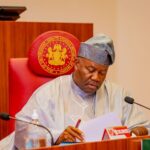The Senate and House of Representatives on Friday passed the 2024 budget for second reading barely two days after President Bola Ahmed Tinubu presented the N27.5 trillion proposal to the parliament.
Tinubu had on Wednesday presented the estimates to the joint session of the National Assembly and appealed to the lawmakers to fast-track its passage.
The budget has a total aggregate revenue projection of N18.32trn and a deficit of N9.18trn (3.88 per cent of GDP).
Capital expenditure gulps N8.7trn while N18.51trn is allocated to recurrent expenditure, of which N10.26trn would be on non-debt recurrent expenditure while N8.25trn would go to debt servicing and N234bn on sinking funds for maturing bonds.
The breakdown of the budget estimates showed that the defence and security sector received the highest allocation of N3.25trn, which is about 12 per cent of the budget.
Security is followed by education, N2.2trn (about 7.9 per cent); the health sector received about N1.4trn (5 per cent) while infrastructure spending is 5 per cent of the budget, which is N1.32trn.
The bill was passed for second reading during Friday’s plenary in both chambers after lawmakers debated its general principles without having the breakdown of the estimates, including sectoral allocations.
Speaking during the debate, some senators lamented the non-availability of the budget breakdown, which they said limited their comments to the president’s speech.
They, however, decried poor allocation to critical sectors, especially education and power.
Senator Enyinnaya Abaribe (Abia South) said: “I have looked at the Appropriation Bill and I discovered that the provision for the power sector is three percent. Power is very fundamental. How do we generate jobs if there is no power? I think we need to reorder the budget otherwise the whole thing will be garbage in, garbage out.”
The minority leader, Senator Abba Moro (Benue South) said the 7 per cent allocation to the education sector was against UNESCO’s recommended 26 per cent of the national budget.
He said the poor vote for education in the 2024 budget would be a serious problem to the president’s effort on human capital development, especially educating children.

 Join Daily Trust WhatsApp Community For Quick Access To News and Happenings Around You.
Join Daily Trust WhatsApp Community For Quick Access To News and Happenings Around You.


